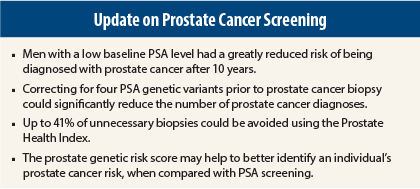Prostate cancer is one of the most common cancers in American men, yet controversy over the utilization and frequency of prostate-specific antigen (PSA) screening methods remains, due to the overdiagnosis and overtreatment of men with low-grade, less-aggressive forms of the disease. At the 110th Annual Scientific Meeting of the American Urological Association (AUA), several studies examined new approaches to smarter prostate cancer screening methods.
Long-Term Risk Directly Related to Baseline PSA Level
New research from Kara Choate, MD, and colleagues of the University of Texas Health Science Center at San Antonio suggests that, for men with low baseline PSA levels (0.1–0.9 ng/ mL), repeated prostate cancer screening on an annual basis was not required and could be conducted once every 10 years.1 According to the researchers, this approach has the potential to reduce the cost of screening dramatically as well as significantly reduce the detection of low-grade, potentially inconsequential prostate cancer.
Researchers evaluated men with no history of prostate cancer over an average of 7.4 years to determine whether baseline PSA levels could predict intermediate-term risk of prostate cancer. Of the 2,923 men studied, 302 were diagnosed with prostate cancer during follow-up.
Men with lower baseline PSA levels (0.1–0.9 ng/mL) had a greatly reduced risk (2%–5%) of being diagnosed with prostate cancer after 10 years, and 90% of those cancers were low-risk cancers. By comparison, men with higher PSA levels (2.3–9.9 ng/ mL) had a 10% to 36% risk of cancer detection, reaching a 36% risk of cancer after 10 years.
Genetic Correction of PSA Levels May Reduce Unnecessary Biopsies
Understanding a man’s genetic risk for prostate cancer could potentially reduce the number of biopsies and diagnoses of low-grade, low-risk prostate cancer, according to investigators in a Northwestern University–led study. James Kearns, MD, presented the study.
Using genotypes of four genetic variants associated with serum PSA levels, researchers studied how genetic correction of PSA levels in men with known low-risk prostate cancer resulted in PSA results below biopsy thresholds. Results from the study showed that in the surgical cohort, genetic correction of serum PSA levels was associated with a significantly decreased percentage of men meeting biopsy thresholds of ≥ 2.5 ng/ mL and ≥ 4.0 ng/mL.
Similar analyses in the active surveillance cohort demonstrated that genetic correction of these four PSA genetic variants could potentially reduce the number of biopsies and prostate cancer diagnoses by 39% and 40%, respectively. By correcting for the effects of these variants on PSA levels, it may be possible to create a personalized PSA cutoff to identify more accurately individuals for whom biopsy is recommended.
New Biomarker Index Detects Aggressive Prostate Cancer
The Prostate Health Index (PHI) demonstrated better specificity than total PSA or percent-free PSA and could be a useful tool to decrease unnecessary prostate biopsies, according to Claire De La Calle, MD, and colleagues of Emory University School of Medicine, University of Michigan Medical School, Weill Cornell Medical College, and Johns Hopkins University School of Medicine.3
The study applied the PHI, a new formula that combines three well-known biomarkers (total PSA, percent-free PSA, and proPSA) to discern aggressive prostate cancer from slow-growing cancer or no cancer in men who had not previously had biopsies. Based on PHI cut points and corresponding specificities that were calculated at three fixed sensitivities (95%, 90%, and 80%), results from the study showed that up to 41% of unnecessary biopsies could be avoided using PHI.
Prostate Genetic Score Stratifies Baseline Prostate Cancer Risk
New research evaluates the genetic risk for prostate cancer as a means of improving PSA screening methods for high-risk patients.4 Using data collected from the Prostate, Lung, Colorectal, and Ovarian Cancer Screening Trial (PLCO), Michael Liss, MD, and colleagues of the University of Texas Health Science Center at San Antonio, Wake Forest School of Medicine, University of California at San Diego School of Medicine, and Fudan University in Shanghai evaluated and aggregated genomic data from 2,244 patients with no cancer, nonaggressive cancer, or aggressive prostate cancer. Results showed that using the prostate genetic risk score may help to better identify an individual’s prostate cancer risk as well as identify patients who may benefit from screening.
“These studies demonstrate progress toward more targeted approaches to prostate cancer screening and further our evolution from a ‘one-size-fits-all’ approach,” said Scott Eggener, MD, AUA Spokesperson and Associate Professor of Surgery for Urologic Oncology at the University of Chicago Medicine. “Although more research is needed, these data show promise in new techniques to minimize unnecessary biopsies and more accurately identify high-risk patients.” ■
Disclosure: Dr. Eggener reported no potential conflicts of interest.
References
1. Choate K, Gelfond J, Ankerst D, et al: Long-term risk of prostate cancer is directly related to baseline PSA. 2015 American Urological Association Annual Scientific Meeting. Abstract MP77-09. Presented May 19, 2015.
2. Kearns J, Helfand B, Roehl K, et al: Genetic correction of PSA can reduce the number of men diagnosed with potentially insignificant prostate cancer: Results from a surgical and active surveillance cohort. 2015 American Urological Association Annual Scientific Meeting. Abstract PD38-07. Presented May 18, 2015.
3. De La Calle C, Patil D, Wei J, et al: Multicenter evaluation of the Prostate Health Index (PHI) for detection of aggressive prostate cancer in biopsy-naive men. 2015 American Urological Association Annual Scientific Meeting. Abstract PD46-02. Presented May 18, 2015.
4. Liss M, Xu J, Chen H, et al: The Prostate Genetic Score (PGS) stratifies baseline risk of prostate cancer and improves PSA performance in the PLCO trial. 2015 American Urological Association Annual Scientific Meeting. Abstract PD44-01. Presented May 18, 2015.





